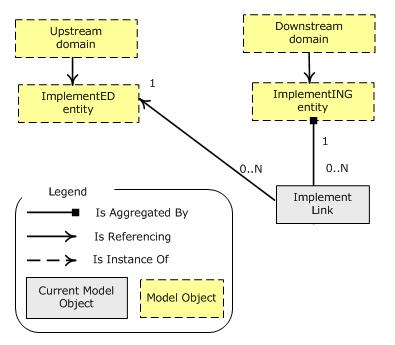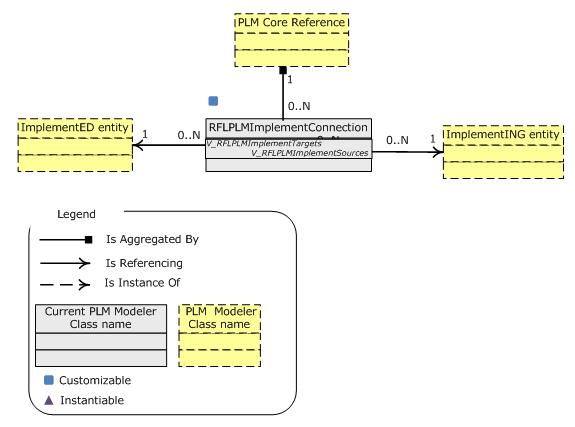
Implement Link Modeler Description & Customization |
| Technical Article |
|
This article presents the Implement Link modeler, and explains how to customize it. |
This section first presents the objects representing the Implement Link modeler. Then it describes how this object model view has been translated towards PLM objects based on PLM Core Modeler objects. You will see the description of each PLM package defining these PLM objects.
The Implement Link modeler provides capability to set relationships between entities of different domains (e.g. R.F.L.P., P.P.R.). This relationship isolates each domain from each others and set a contract between involved entities. The downstream entity setting the contract (i.e. Source) implements the upstream entity it relies on (i.e. Target).
This is summarized in the following UML schema:
 |
The Implement Link model is implemented with PLM Core Object as follows:
 |
The following array shows the links between the conceptual and PLM Core objects:
| Model Object | PLM Modeler Type | PLM Core Type | Modeler PLM Package |
|---|---|---|---|
| Implement Link | RFLPLMImplementConnection | PLMConnection | RFLPLMImplementConnection |
This section lists and describes the PLM Opening ID implemented by the following PLM classes of the Implement Link modeler.
| PLM Opening ID | Script Contents |
|---|---|
| PLMIdentificationInitialization | Valuates PLM_ExternalID attribute. |
Customization first deals with the modeler PLM package customization [2]. It consists in creating a new package containing new PLM classes for each "Customizable" PLM class of the modeler PLM package. Then, you should take into account the UI masks creation to create either a new security mask file, or to update the default one [3]. Finally, you can integrate your own business logic on each new PLM classes by implementing provided PLM opening ID [4].
This part consist in creating a new package when the modeler PLM package must be customized.
Must be fullycustomized.
| PLM Class Name | To Be Customized |
|---|---|
| RFLPLMImplementConnection | Yes |
When a PLM attribute is defined (inside modeler PLM package) some features like its editability criteria, mandatory /optonal option, can be overwriten by UI mask. You can say this PLM attribute is not writable in Query context, this PLM attribute is mandatory in Create context, this user PLM attribute is not never visible and so one. A set of UI masks form a security mask file. We say security mask because it is associated with these files security information. For a people, and a given context can be associated a security mask.
For each customized Modeler PLM package, at least one UI mask file must be created (for the default security mask ), since it must contain the new PLM Attributes. When you use the tool to create a customization, a default UI mask file is provided taken into account the added PLM attributes. You can modify the default file to introduce your change .
No specific rule to customize UI mask file.
You can yourself integrate your business logic for each customization of:
PLM Opening ID Remarks Business Logic Reference Refer to openness provided by PLM infrastructure
| Version: 1 [Oct 2008] | Document created |